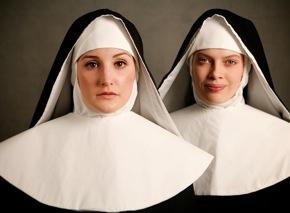The Music Never Stopped
"And the fields are full of dancin'
"Full of singin' and romancin'
"The music never stopped."
The Grateful Dead song is now the title and heart of a new movie, based on Oliver Sacks' essay The Last Hippie.
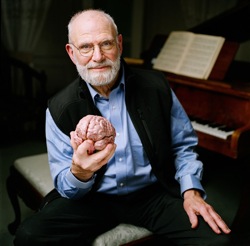
Photo by Adam Scourfield
Why should San Francisco Classical Voice care? Because, regardless of the specific genre, Sacks, director Jim Kohlberg, and this film are all about the great, life-affecting power of music. It is coming to Bay Area theaters next week.
Beethoven once said music lives between the spiritual and the sensual life. This is well-expressed in numerous movies about music. In Kohlberg's The Music Never Stopped, the focus is on how music defines characters and moves them through their lives at their most dramatic — loss, tragedy, recovery, and hope.
Sacks' books Awakenings and The Man Who Mistook His Wife for a Hat (which Michael Nyman turned into an opera) are his best-known works, but Musicophilia: Tales of Music and the Brain is perhaps the most important, from our point of view. Made into a PBS Nova program called "Musical Minds," it has been revelatory about the neurological underpinnings of the perception and significance of music.
"All of us respond to music," Sacks has said. "It exists in every culture, it calls up emotions. ... The fact that this happens, even in someone with amnesia, is startling and wonderful for people to see."
In Hippie, Sacks, who helped to found the Institute for Music and Neurologic Function, deals with a man suffering from a rare brain tumor who cannot communicate with people except through the music of The Dead and Bob Dylan.
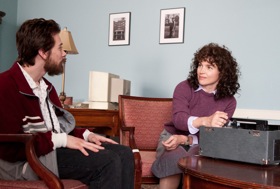
A sensational young actor, Lou Taylor Pucci (of Thumbsucker and Brotherhood), plays the main character, Gabriel, who runs away from home at age 17 (because he was forbidden to attend a Dead concert) and returns at 37, seemingly disconnected from everything. Pucci, 24, plays the character over a 20-year span brilliantly.
J.K. Simmons plays Gabriel's father, who is helped by shared music to return from alienation to supportive parenthood after two decades of separation. Julia Ormond portrays the music therapist, in a role similar to Robin Williams' in Awakenings.
For Gabriel, after the operation for the brain tumor, past, present, and future become indistinguishable, and he lives fixed in the era of Vietnam, acid tests, and psychedelic music. Determined not to let their son slip away from them again, his father and his mother (Cara Seymour) persist in communicating with him through whatever means they can. It is music that provides the magic solution.
Coincidentally, Stanford University has just concluded an extensive conference on Music and the Brain.
Music and Rehabilitation — from Today's Headlines
The best-known current rehabilitation from brain injury is that of Arizona Rep. Gabrielle Giffords, shot at close range just weeks ago in Tucson.
Her mother reports from a Houston hospital where Giffords is recovering that "It was music therapy that 'really flipped the switch.' She mouthed 'Twinkle, Twinkle, Little Star' and 'I Can't Give You Anything But Love' as friends provided keyboards and chorus.
"She also lip-synced 'Happy Birthday to You' in a videotape for her husband, astronaut Mark Kelly. They are planning to do 'Deep in the Heart of Texas' next."
Will Crocetto Become 'Singer of the World'?
One of San Francisco's most celebrated young singers in recent years, soprano Leah Crocetto, was named to represent the U.S. in this year's BBC Cardiff Singer of the World competition. She won the place among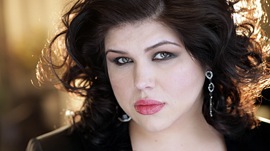 600 vying for the 20 finalist spots.
600 vying for the 20 finalist spots. Cardiff winnners include Dmitri Hvorostovsky, Karita Mattila, Nina Stemme, and other leading singers in the world.
Crocetto is a third year Adler Fellow. She was a 2010 Grand Finals Winner of the Metropolitan National Council Auditions; 1st Place Winner, People's Choice and Spanish Prize winner at the José Iturbi International Music Competition and winner of a Sara Tucker Career Grant.
This season includes her European debut as Leonora (Il trovatore) with Opéra National de Bordeaux and as soloist in Mahler's Second Symphony at the Grand Teton Festival, conducted by Donald Runnicles.
At the San Francisco Opera last season, she covered Leonora (Il trovatore) and Desdemona (Otello), and was the High Priestess in Aida last fall. She sang her first performance of the Verdi Requiem in her debut with the Los Angeles Philharmonic and Gustavo Dudamel and will perform it again with Columbus Symphony and Albany Symphony.
Crocetto has an engagement at the Hollywood Bowl singing Beethoven's Ninth Symphony with the Los Angeles Philharmonic and Rafael Frübeck de Burgos.
Future plans include Liù (Turandot) at San Francisco Opera, Desdemona (Otello) at Frankfurt Opera, and the Poulenc Gloria with the Berlin Philharmonic Orchestra.
Carmen in 3-D
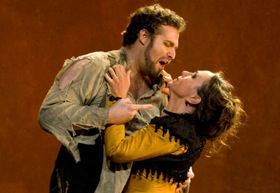
More from the intersection of cinema and music: Here's a surprising report about the new 3-D Carmen. The surprise is on me, because I am definitely not a fan of 3-D movies ... but this is a good one.
The Royal Opera House/Covent Garden production has strong local connections: The director is San Francisco Opera Artistic Advisor Francesca Zambello, and Don Jose is sung — excellently well — by 2001 Merola Program participant Bryan Hymel.
Zambello's production keeps things in constant motion, and with 3-D — wearing special glasses, alas — you are in the middle of all that action, at times uncomfortably so. Being on top of it all, you can’t look away from the street urchins' nonstop fights and mischief, but, on the other hand, the views of the principals are better, certainly not like those of Peter Sellars' extreme closeups in the Met HD cast of the visually botched Nixon in China.
Christine Rice sings the title role in an aggressive, earthy fashion, and Maija Kovalevska's Micaela is lovely. Constantinos Carydis’ conducting of the excellent Covent Garden orchestra is excessively stately at times, especially at the beginning, but he rises well to the big emotional climaxes.
There are no in-your-face tricks in the 3-D format; the sharp depth-of-field view of the big stage is excellent, except when Zambello's urchins can't stop beating up on each other.
"Often you want a set to give the sense that there is a 50-foot depth," says Zambello. "But with 3-D cameras, you get that perspective. With many opera DVDs, you are down someone's throat. 3-D allows you to get the bigger picture but also makes you feel like it is intimate — it gives a sense of the scale, while being personal."
Pacifica Tonight
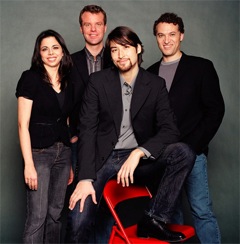
The always-adventurous and outstanding Pacifica Quartet is giving a typically varied concert tonight in Herbst Theatre, of Haydn, Brahms, Stravinsky ... and Widmann.(See preview
Jörg Widmann, a German clarinetist, first composed works for his own instrument, and then expanded the scope widely, especially to string quartets. His work on this concert is Quartet No. 3, "Hunting," which he describes as:
... a development of a wholesome dotted hunting theme (borrowed from Schumann’s Papillons) to the point of the splintering of the initially positivistic hunting character and then finally to its skeletonizing.Pacifica — consisting of Simin Ganatra and Sibbi Bernhardsson, violins; Masumi Per Rostad, viola; and Brandon Vamos, cello — will also perform Haydn's "Lark" Quartet.At the same time, the situation of the four instrumentalists changes: The braggart hunters go on to be hunted, to be pursued. The fact that three high strings conspire against the cello in a further (deadly) change of perspective and put the blame on this instrument is an analogy to social patterns of behavior.
The playful and overwound tone maintained throughout only with difficulty conceals the seriousness that suddenly has found its way into the piece.
Widmann himself joins the ensemble for the Brahms Quintet in B Minor for Clarinet and Strings, Op. 115, and performs Stravinsky's Three Pieces for Clarinet Solo.
A Recommendation Appearing Futile, Until the Punch Line
It was news received with mixed emotions just last night from Laurie Cohen of Mill Valley Philharmonic:
"Sunday, March 13th advance seating is sold out. Some standing room will be available. Advance tickets will be held until 10 minutes before start time. Please leave time to park."
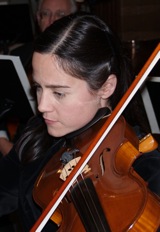
Glad that they are doing so well, I feel a bit disappointed not to have a chance to tell about what sounds like a terrific concert ... so I will anyway, perhaps to motivate more listeners to vie for unclaimed tickets.
Cohen is conducting a joint concert with the Dominican University Winifred Baker Chorale, offering substantial excerpts from Schubert's Mass No. 6 in E Flat. The concert also features soloists who were winners of the Philharmonic's concerto competition.
They are: Elisabeth Zosseder, performing the Handel Harp Concerto; Katie Butler, singing the Queen of the Night's aria from The Magic Flute; cellist Marian Schuchman, in Chant du Menestrel by Glazunov; and Elizabeth Dinsel and Cindi Kasarian, performing the Bruch Concerto for Clarinet and Viola.
And, as always, these Philharmonic concerts are free, requiring only advance reservations on line.
The punch line: The same concert will be also performed in Angelico Hall at 8 p.m. Friday and 4 p.m. Saturday. Don't stand on Sunday, sit at one of the other concerts — if they are still available.
Reign of Terror, the Opera
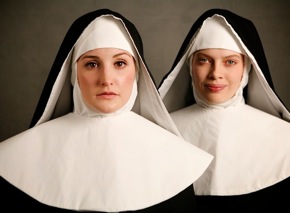
Photo by Betsy Kershner
There is no sound like it in all opera: The guillotine comes down with a harsh thud, silencing voice after voice — until the last one is stilled. This is the uniquely dramatic finale of Francois Poulenc's 1953 Dialogues of the Carmelites, an opera with some of the most beautiful melodies you'll hear anywhere.
San Francisco Opera gave the U.S. premiere in 1957 with a cast headed by Leontyne Price, Dorothy Kirsten, and Blanche Thebom. Dialogues was given its most recent outing in the War Memorial in 1982, with Price again, Carol Vanness, and Régine Crespin. Why its absence for three decades?
It is a big, difficult production to handle: a sprawling story about deciding between conscience and survival in face of the 1793-1794 period immediately following the French Revolution. The era was marked by mass executions of "enemies of the revolution," including the aristocracy and members of religious orders, such as the Carmelite nuns.
"It not only requires a sophisticated level of musicality, but it also demands a broad range of acting skills," says Richard Harrell, director of the S.F. Conservatory of Music Opera Theater.
The student organization is bravely producing the work in Cowell Theater, March 31–April 3. Harrell is stage director and Oakland East Bay Symphony’s Michael Morgan conducts the performances.
Says Morgan:
Dialogues is one of those pieces in opera where everything that matters about opera comes together. The story is compelling, the characters are engaging, and the music is both emotionally stirring and beautiful.Harrell adds:Because there are not arias in the traditional sense, it is harder for the piece to be a hit with the public. But those who give themselves over to drama will be extremely moved by it.
It has been a pleasure to be involved with the students in this production. As with any student production, you wind up with people in roles they are far too young to play, but musically (and given the abundant female roles) it was an astute choice for the conservatory.
The musical language of the work has a rich and dramatic texture; melodic "tunes" tend to be assigned to the beautiful liturgical Latin prayers which Poulenc composed mostly as ensemble numbers.The "dialogues" between characters are very speechlike in nature, which requires concentrated dramatic intention from the performers. These musical and dramatic challenges are ideal teaching tools for training the kind of singing actors found in professional opera houses today.
True Divided Light
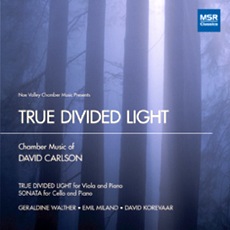
The composer, David Carlson, speaks of evocative metaphors — light versus darkness, "a window into the soul ... refracted colors juxtaposed to convey meaning and emotion."
This Noe Valley Chamber Music CD, recorded in the Music Recital Hall of UC Santa Cruz, has other local connections: The title work, for viola and piano, is performed by Geraldine Walther and David Korevaar; the other work by Carlson, his Sonata for Cello and Piano, is with Emil Miland and Korevaar.
Dance Anywhere/Everywhere

The idea is simple, a bit funny, and altogether heroic: Thousands of people around the world act like a flashmob, and all start dancing at the same time. The origin of "Dance Anywhere," however, antedates newfangled Web activation of joint activities. This is the seventh annual event, and you don't need text messaging: Just look at the clock (or you smart phone, whatever). When both the big and the little hands hit 12 ...
On March 18, when it's noon on the West Coast, it's 3 p.m. on the East Coast, and 8 p.m. in Paris, Rome, etc. Wherever you are, that's the time to start dancing. Officially called the Seventh Annual Conceptual Public Art Performance Piece, "Dance Anywhere" is a global call for people everywhere to participate in the project.
The creator of the event, Beth Fein, says, "This is an open invitation to all: to stop and dance wherever they will be. What is so wonderful about 'dance anywhere' is that it is a way for everyone, anywhere, to be creative to pause in their busy lives and dance with the whole world."
Meaning to "dissolve the line that often separates art and dance from our daily lives," the invitation is for dancing on or off a stage: "Our immediate environment is our stage and we should all stop to dance as a worldwide community and momentarily transform our familiar and ordinary locations.”
A sampling of 2011 Bay Area locations: the 16th Street Mission BART station, SFMOMA, Berkeley Art Museum, The Oakland Museum of California, and the Frank Ogawa Plaza in downtown Oakland.
Last week, we ran a column item about Sunday broadcasts of San Francisco Symphony's new Keeping Score series on KDFC-FM, 90.3 and 89.9, but apparently the time was wrong — it should be 6 p.m.
Also, KALW-FM, 91.7, will broadcast the series Monday nights at 9 p.m., beginning April 4; and KQED-TV will show the television series April 14 and 21, with more PBS broadcast dates to be announced later.
KQED radio, 88.5 and 89.3, will also broadcast the programs on Saturday evenings at 9 p.m. With this welcome profusion of participation by local public radio stations, there is no excuse to miss these broadcasts.
The series — called 13 Days When Music Changed Forever — will be heard April 2 through June 25. All programs are pegged to historical dates, in a lineup like this in April:
April 2 (KQED)/April 3 (KDFC)/April 4 (KALW) — Feb. 24, 1607: "The Premiere of Monteverdi's L'Orfeo"
April 9/10/11 — April 22, 1723: "The Town Council of Leipzig Appoints Bach as Cantor"
April 16/17/18 — Oct. 29, 1787: "The Premiere of Don Giovanni in Prague"
April 23/24/25 — Aug. 8, 1803: "Parisian Piano Maker Sebastien Erard Gives One of His Sturdy New Creations to Beethoven"
Jet-Setter Conductor No. 1
Michael Tilson Thomas, having made a brief stop in San Francisco after his concerts in Miami (to inaugurate a new hall for his New World Symphony), in Philadelphia, and elsewhere, is now off to Sydney and the upcoming YouTube Orchestra events. Then, in just a few days, he is circling the globe all the way to New York, and where he will lead the Philharmonic there for the first time in 15 years.He will conduct Prokofiev's Overture in B-flat major, "American"; Tchaikovsky's Symphony No. 2, "Little Russian"; and the New York premiere of Sofia Gubaidulina's In tempus praesens concerto for violin and orchestra, with Anne-Sophie Mutter, for whom the work was written. The latter work’s North American premiere took place in San Francisco two years ago.
Mutter is in residency in New York, performing world premieres by Wolfgang Rihm, Krzysztof Penderecki, and Sebastian Currier.
Music and Theater Meet in L.A. Philharmonic's HD Cast

The next "LA Philharmonic LIVE" HD cast combines Gustavo Dudamel conducting the music of Tchaikovsky, with notable actors performing from works that inspired the composer.
The telecast at 2 p.m. on March 13, includes Tchaikovsky suites for the orchestra, combined with scenes from Shakespeare's Hamlet, The Tempest, and Romeo and Juliet, performed by Orlando Bloom, Malcolm McDowell, and Matthew Rhys, directed by Kate Burton.
Participating local theaters include San Francisco Cinearts Empire 3, Century 9, Daly City 20, Century Theatres at Tanforan, AMC Bay Street 16 in Emeryville, and others.

